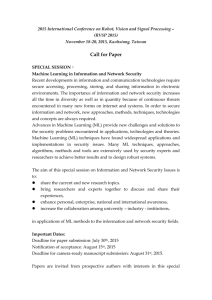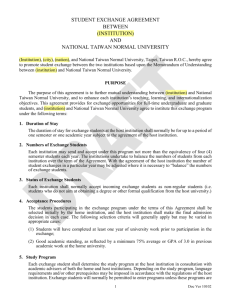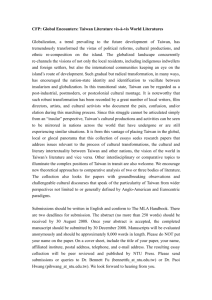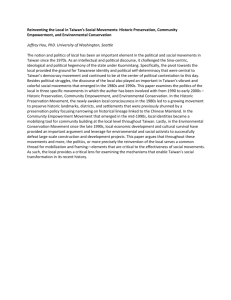View/Open
advertisement
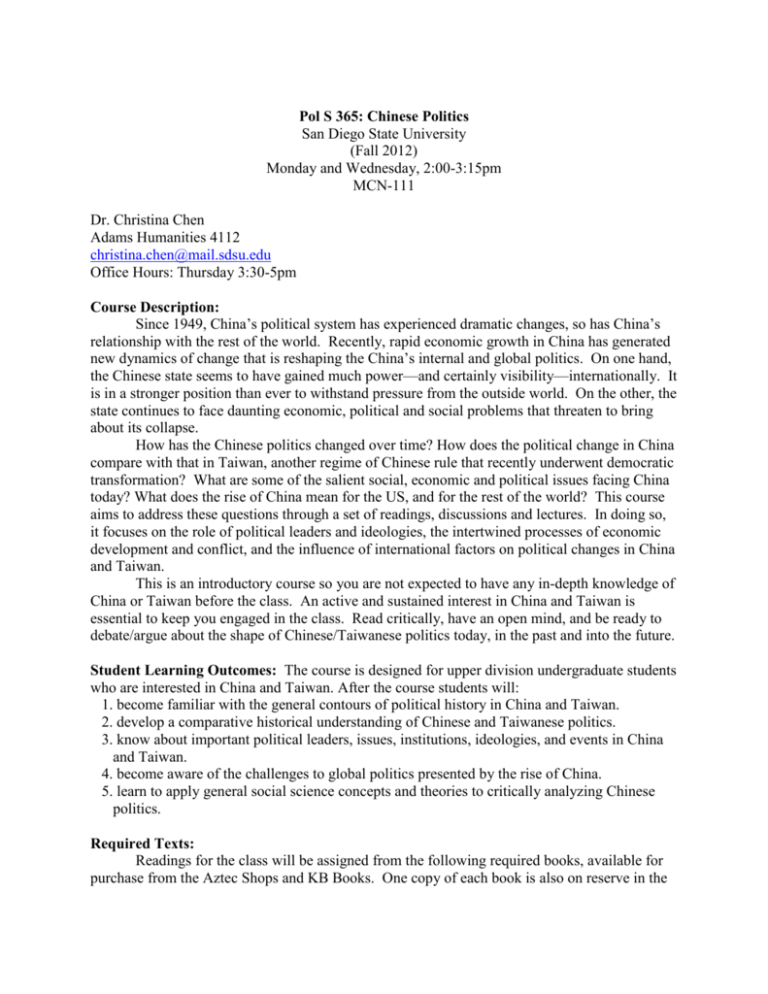
Pol S 365: Chinese Politics San Diego State University (Fall 2012) Monday and Wednesday, 2:00-3:15pm MCN-111 Dr. Christina Chen Adams Humanities 4112 christina.chen@mail.sdsu.edu Office Hours: Thursday 3:30-5pm Course Description: Since 1949, China’s political system has experienced dramatic changes, so has China’s relationship with the rest of the world. Recently, rapid economic growth in China has generated new dynamics of change that is reshaping the China’s internal and global politics. On one hand, the Chinese state seems to have gained much power—and certainly visibility—internationally. It is in a stronger position than ever to withstand pressure from the outside world. On the other, the state continues to face daunting economic, political and social problems that threaten to bring about its collapse. How has the Chinese politics changed over time? How does the political change in China compare with that in Taiwan, another regime of Chinese rule that recently underwent democratic transformation? What are some of the salient social, economic and political issues facing China today? What does the rise of China mean for the US, and for the rest of the world? This course aims to address these questions through a set of readings, discussions and lectures. In doing so, it focuses on the role of political leaders and ideologies, the intertwined processes of economic development and conflict, and the influence of international factors on political changes in China and Taiwan. This is an introductory course so you are not expected to have any in-depth knowledge of China or Taiwan before the class. An active and sustained interest in China and Taiwan is essential to keep you engaged in the class. Read critically, have an open mind, and be ready to debate/argue about the shape of Chinese/Taiwanese politics today, in the past and into the future. Student Learning Outcomes: The course is designed for upper division undergraduate students who are interested in China and Taiwan. After the course students will: 1. become familiar with the general contours of political history in China and Taiwan. 2. develop a comparative historical understanding of Chinese and Taiwanese politics. 3. know about important political leaders, issues, institutions, ideologies, and events in China and Taiwan. 4. become aware of the challenges to global politics presented by the rise of China. 5. learn to apply general social science concepts and theories to critically analyzing Chinese politics. Required Texts: Readings for the class will be assigned from the following required books, available for purchase from the Aztec Shops and KB Books. One copy of each book is also on reserve in the Love Library for two-hour loan at a time. Additional readings that are not from these books will be posted on the Blackboard. 1. William Joseph, ed., Politics in China: An Introduction, Oxford, 2010. 2. Jonathan Manthorpe, Forbidden Nation: A History of Taiwan, Palgrave MacMillan, 2009. 3. Susan Shirk, China, Fragile Superpower: How China's Internal Politics Could Derail Its Peaceful Rise, Oxford, 2008. IMPORTANT: Please consult the course schedule at the end of this syllabus for each class session’s reading assignment. You are expected to have completed all the readings for each class prior to coming to the class. Reading the texts in advance will help you digest the lectures. Pop quiz questions will be mainly based on the readings. Some useful links for additional reading about China outside of the class: 1. The China Beat: Blogging how the East is Read: http://thechinabeat.blogspot.com/ China Beat examines media coverage of China, providing context and criticism from China scholars and writers. 2. AsiaMedia is a daily electronic publication that delivers news about all aspects of the media in Asia, including its role in regional and national economies, societies, and political debate. http://www.asiamedia.ucla.edu/eastasia.asp. 3. The New York Times with free online subscription is available at www.nytimes.com. 4. The Economist, a British weekly covering the economic and political trends around the world, at www.economist.com. 5. A list of important China area journals: full-text articles are available via the electronic database in the SDSU library: China Quarterly, Journal of Contemporary China, Modern China, and the China Journal. Attendance and participation (15%): Attendance is mandatory for this class. If you need to be absent for medical or family emergency reasons, please be sure to notify the instructor before the class (or as soon as possible) via email or phone and provide proper documentation (e.g. doctor’s note or supervisor/parental letter) to the instructor subsequently. Please come to class on time and stay till the end of class unless you have given me an advance notice. I encourage regular and active participation in the class. To ensure that each person will get a chance to speak up in class, I will institute a special period of time (about ten minutes at the beginning of Tuesday classes) for student participation. In addition, I will ask questions in class. This not only helps you learn from each other but also helps me gauge my teaching effectiveness. Tuesday Report Card: Each Tuesday (unless otherwise noted), for the first ten minutes of the class, I will invite two students to each report on one piece of current news reporting on anything that relates to China or Taiwan. The reporter may summarize the news report, put the news story in context, and explain its significance to us. Each student is expected to make at least four report-card presentations throughout the term. Try to form the habit of speaking up early in the semester. Please be attentive and respectful to your classmates when they speak. 15% of your final grade will be based on your attendance and my assessment of your participation effort in the class. Quizzes, Exams and Final Paper: 1. Pop quiz on the reading (10%): There will be several pop quizzes on the reading, usually at the beginning of the class. The quizzes will consist of very simple definition or objective questions (e.g. multiple choice, T/F, etc.) that cover the readings up to (and including) the day of the quiz. Please pay attention to the weekly schedule. There will be no make-up for the quizzes, however each student is allowed to drop one quiz with the lowest score. 2. Mid-term and final exams (25% + 25% = 50%): There will be two in-class exams. You will be asked to define and explain key terms or concepts and to answer a few essay questions. The final exam will only include the material covered since the mid-term. Please remember to bring your own blue books. There will be no make-up exams for any other reason than medical or family emergency. 3. Final paper (25%): You are required to turn in one short paper on any aspect of Chinese or Taiwanese politics at the end of the term. More details about the paper topics will be announced later in the semester, but the paper should include at least three references to class readings, plus minimally necessary additional research (limited to five outside references). Ability to incorporate course readings and lectures into your paper is very important in my evaluation of the paper. To encourage collaboration, you may find one other student in the class to co-author the paper, in which case you will also need to attach a statement explaining each person’s contribution to the paper. The paper should be about 5 - 7 pages in length, typed and doublespaced with standard fonts and margins (Special note: students who take this class to satisfy the political science capstone requirement will need to submit a single-authored paper of 10-15 pages long). Please submit a hard copy of the paper on the final exam day, along with an electronic copy as email attachment to my email address listed on the syllabus. I reserve the right to submit your paper to “turnitin.com” for textual similarity review for any suspected plagiarism. Zero tolerance on plagiarism: Plagiarism is about presenting other people’s ideas and writings as your own work. It may happen intentionally through direct copying of someone else’s words (e.g. specific phrases, sentences or paragraphs), or inadvertently through one’s failure to cite the source of information. Regardless, plagiarism is a serious form of cheating that could result in your failing the course. When in doubt, please ask. I have zero tolerance for any plagiarism in the class. Grades: Your grade will be based on your overall class performance, including the quizzes, exams, short paper and class participation. Attendance and participation (Tues. Report card) 15% Quizzes 10% Mid-term exam 25% Final exam 25% Term paper 25% COURSE SCHEDULE AND READINGS I. CHINA AND TAIWAN: INTERTWINED POLITICAL HISTORIES August 27 (M) Introduction to the class, Q&A 29 (W) Wars, revolutions and communism: the CCP’s road to power William Joseph, chapter 2, pp. 37-61. September 3(M) 5(W) Labor Day, no class China under Mao (I), 1949 - 1965 Land reform, the Great Leap Forward and mass mobilization William Joseph, chapter 3, pp. 63-83. 10(M) China under Mao (II), 1966 - 1976 The Cultural Revolution period Documentary: “Morning Sun” (excerpt) 12 (W) The Cultural Revolution (continued) William Joseph, chapter 3, pp. 83-102. 17(M) China’s reform under Deng, 1978 - 1989 William Joseph, chapter 4, pp. 103-114. 19 (W) China’s reform after the 1990s William Joseph, chapter 4, pp. 114-125. 24 (M) Ideological changes from Mao to the present William Joseph, chapter 5, pp.129-162. 26 (W) Formal government institutions in China William Joseph, chapter 6, pp. 165-190. October 1(M) A brief history of Taiwan, in relation to mainland China Manthorpe, Chapter 2, 12, 13 (pp. 21-34, 157-178) William Joseph, Chapter 17 (pp.367-371) 3 (W) Politics in Taiwan under the Chiang’s (1945 - 1986) Manthorpe, Chapters 15, 17 (pp. 187-194, 201-210) William Joseph, Chapter 17 (pp. 371-373) 8(M) Democratization in Taiwan Manthorpe, Chapters 19-20 and Epilogue (pp. 227-270). William Joseph, Chapter 17 (pp.373-380) 10 (W) Formal political institutions in Taiwan John Copper, “Political System (Taiwan)” (on Blackboard) 15 (M) The question of democracy: will China follow Taiwan’s lead? Larry Diamond, “Why China’s democratic transition will differ from Taiwan’s” (Blackboard) 17 (W) Mid-term exam II. CONTEMPORARY CHINESE ECONOMY, POLITICS AND SOCIETY 22(M) Economic reform in China William Joseph, chapter 7, pp. 192-218. Susan Shirk, chapter 2, pp.13-34. 24 (W) Political protest in the early reform period Documentary: “The Gate of Heavenly Peace” (excerpt) 29 (M) Political dissent in China today TBA. 31(W) Reform and resistance in rural China William Joseph, chapter 8, pp. 225-247. November 5(M) Social (in)stability in China Susan Shirk, chapter 3, pp. 35-78. 7 (W) Population and environment in China William Joseph, chapter 11 and 13 (pp. 278-287, 298-312). 12(M) 14 (W) Veteran’s Day, no class Tibet, Xinjiang and ethnic politics in China William Joseph, Chapters 14 and 15 (pp.315-355) III. CHINA ON THE WORLD STAGE 19 (M) How China views the world: sources of its foreign policy William Callahan, “China’s grand strategy in a post-Western world” (on Blackboard) Susan Shirk, Chapter 1, pp.1-12. 21 (W) Nationalisms in China Susan Shirk, chapter 4, pp.79-104. 26 (M) China and its Asian neighbors Susan Shirk, chapter 5, pp. 105-139. 28 (W) China’s Japan complex Susan Shirk, chapter 6, pp.140-180. December 3 (M) China, Taiwan and the United States Susan Shirk, chapter 7, pp.181-211. Manthorpe, chapters 16, 18, (pp. 195-200, 211-225) 5 (W) China’s rise and its challenge to the world David Shambaugh, “Coping with a conflicted China” (on Blackboard) Susan Shirk, chapter 9, pp.255-270. 12 (W) Final Exam,1:00 pm - 3:00 pm Final paper due before the exam. Please bring one hard copy to class, AND send an e-copy as email attachment to chen422@usc.edu





